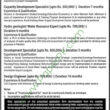Obtaining the necessary certificates for contractors is a crucial step in ensuring compliance, safety, and credibility in the construction industry. Certifications demonstrate that contractors have the required skills, knowledge, and qualifications to perform their tasks effectively and in accordance with industry standards. So, when it comes to seeking yours, this is what you need to consider.

Also Read: Streamlining Construction Finances: Key Insights for Contractors
1. Identify Required Certificates
Start by researching the specific certificates that are required in your industry and region. Different types of construction work may require different certifications. Common certificates include Occupational Safety and Health Administration (OSHA) certifications, trade-specific licenses, safety training certificates, environmental certifications, and ISNetworld compliance certifications, which you can get expert help in securing.
2. Research Regulatory RequirementsUnderstand the regulatory requirements in your area. Regulations can vary by state, country, and even local jurisdiction. Research the relevant regulatory bodies that oversee contractor certifications and find out the specific requirements for each certification.
3. Choose a Certification PathOnce you’ve identified the required certificates, determine the appropriate certification path for each. Some may require specific training courses, exams, practical assessments, or a combination of these. Choose the certification path that aligns with your contractor’s expertise and the type of work they perform.
Also Read: 11 Types of Contracts in Civil Engineering
4. Select Accredited Training Providers
When pursuing certifications that involve training, ensure that you choose accredited training providers. Accredited providers offer courses that meet industry standards and are recognized by regulatory bodies. Research reputable training institutions and review their course offerings before enrolling.
Like Us on Facebook!
Enroll in the required training courses for the qualifications you’re pursuing. These courses are designed to provide you with the necessary knowledge and skills to pass the certification exams and perform your tasks safely and competently.
Subscribe Us on YouTube!
For many certifications, passing an examination is a key requirement. Study the materials provided during your training courses and review any additional resources. Consider taking practice exams to assess your readiness and identify areas that need further study.
If your certifications require exams, schedule them and prepare accordingly when ready. On the day of the exam, arrive early, bring any required identification or materials, and approach it with confidence.


















